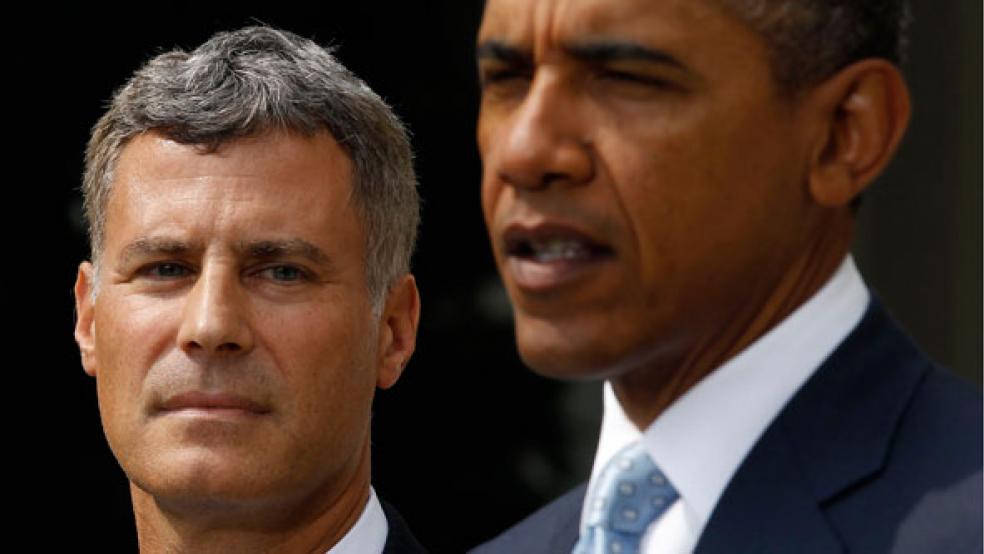President Obama has a new top economic adviser—Jason Furman, a Harvard PhD whose links to the administration stretch back to the 2008 presidential campaign, making him one of the president’s longest serving aides.

Being chairman of the Council of Economic Advisers is a prestigious gig. The job requires Senate confirmation. It involves the preparation of economic assumptions for the budget proposal, the annual economic report of the president, and routine TV spots to discuss items such as the monthly jobs report.
Also, the post tends to be a stepping stone to the top slot at the Federal Reserve; past CEA chairmen include Ben Bernanke, Alan Greenspan, and Arthur Burns.
Alan Krueger—the CEA chairman since late 2011—is returning to a tenured post at Princeton University, the White House announced Tuesday.
Here are ten facts about Jason Furman, who is currently the deputy director for Obama’s National Economic Council:
He’s Connected—His psychologist mother Gail Furman runs the Furman Foundation, which has helped to fund liberal causes, the Council on Foreign Relations, and the New York Shakespeare Festival, among other causes.
Last year, Obama appointed his brother, Jesse, to a federal judgeship in the U.S. District Court for Southern New York.
He first worked in the Clinton-era CEA for then-chairman Joseph Stiglitz, a Nobel Prize winner who is now a Columbia University professor and known for his critical views on globalization and income inequality.
Furman also worked as the economic policy director for John Kerry’s 2004 presidential campaign. He also held posts at the World Bank and the Brookings Institution, in addition to lecturing at Columbia and Yale.
The 42-Year Old New Yorker Juggles—He used to entertain tourists by juggling in Washington Square Park as a teenager.
“Sometimes it was a bowling ball and egg and an apple,” Furman told The New York Sun in 2008. “I never did three bowling balls. Just one."
He Likes Wal-Mart – The big box retailer often gets demonized for its low wages and foreign-made goods.
In a 2005 presentation at the liberal Center for American Progress, Furman noted that low prices at Wal-Mart have saved consumers $263 billion a year. That is drastically more than the $5 billion economic drag caused by its lower wages, making it a “force for good,” Furman said.
His rationale is that Wal-Mart should sign onto the Democratic agenda of expanding Medicaid, raising the minimum wage, and other policies. As you might guess, labor unions objected to these arguments and Furman later joining Obama’s team.
He Once Thought Microsoft Would Maintain an Iron Grip on Computing – Not all economic analyses are perfect.
Along with Stiglitz, Furman predicted in a court filing that the 2001 anti-trust judgment against Microsoft “does not change [its] incentives to undertake anticompetitive acts to stifle consumer choice by thwarting potentially superior products. …[and] would leave intact Microsoft's ability to maintain, and benefit from, its Windows operating system monopoly, while allowing it to continue to limit choices for consumers and stifle innovation.”
Google had been founded in 1998. Apple had introduced its first iPod on October 23, 2001.
His Wife (Eve Gerber) Once Wrote For Slate – Back in 2000, Gerber had a position with the online publication started by Microsoft. She also worked as a speechwriter for retired Army Gen. Wesley Clark’s presidential campaign.
He Once Called to End the Mortgage Interest Deduction—This was a 2005 essay for Slate. He encouraged Democrats to support a proposal by President George W. Bush’s tax commission to eliminate the mortgage interest deduction.
No doubt, this will thrill Obama critics. The president has suggested that tax reform targets pushed by congressional Republicans would constrain the mortgage interest deduction and hurt middle class families. It’s unlikely that Obama would take Furman’s advice from almost eight years ago.
Glenn Beck Mocked Him—In a bizarre racially charged bit, Beck’s radio show used to feature during the 2008 campaign a fictional caller named “Honkey Whitesville” that was based on Furman, according to Washington Life magazine.
One transcript of the show has Honkey trying to prove his downhome credentials by emphasizing that his skin is the color of mayonnaise and toothpaste.
He Supports a Higher Minimum Wage –A 2007 paper for the Center on Budget and Policy Priorities co-written by Furman calls for the minimum wage to be $7.25 an hour to “ensure once more that a family of four with a parent working full time at the minimum wage does not have to raise its children in poverty.”
This idea is dead on arrival with House Speaker John Boehner, (R-Oh.) who claims raising the minimum wage would force small business owners to reduce hours for low-wage workers.
He Does Not Want to Privatize Social Security – A 2008 article by the Los Angeles Times suggested that Furman was open to the idea of privatization.
But that conclusion is not accurate, blogged University of California-Berkeley economist Brad DeLong. When George W. Bush proposed privatizing Social Security accounts in 2005, Furman was quick to point out that the policy would only accelerate the entitlement program’s solvency issues.
He Prefers Tax Credits to Deductions – Here is what Furman told the Senate Finance Committee about tax neutrality in 2008: “To the degree that policymakers depart from neutrality to achieve specific goals like encouraging homeownership or childcare, it is generally better to implement these measures through refundable tax credits rather than deductions.”




